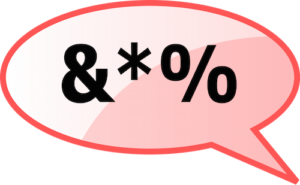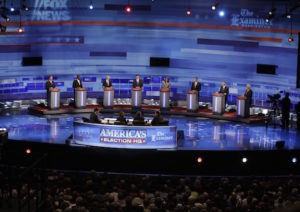
By now we’ve all noticed this election season is full of wild remarks, crazy antics and supporters from all political parties passionate about their beliefs.
Election season is the time for Americans to voice their opinions and express the change and growth they hope to see in the future.
But at what point does the language used by presidential candidates teeter off the line of distasteful and become downright offensive?
For starters, let’s look at the definition of the word ‘offensive.’
The simple definition is “causing someone to feel hurt, angry, or upset: rude or insulting,” according to Merriam-Webster.
Understanding the definition is important, especially when 59 percent of Americans think people are too easily offended by what people say, according to a study by Pew Research Center.
The study focused on political correctness, and how the majority of Americans feel people are too easily offended when language is not ‘PC.’
The breakdown of the study includes political affiliation, race, and age.
Seventy-eight percent of Republicans say people are too easily offended, versus 21 percent who say people should be more careful with what they say.
Out of the Republicans who support Trump, 83 percent claim people are too easily offended by the political language used.
On the Democrat side, 37 percent say people are too easily offended, while 61 percent say people should be careful to not offend others.
Those who are Clinton supporters, 59 percent think people need to be careful with their language.
When it comes to race, minorities believe people should be careful with their language used.
Sixty-seven percent of Blacks say people need to be more careful not to offend others, while 30 percent say people are easily offended by language that is not politically correct.
The margin between Hispanics who say people are too easily offended versus those who should be careful not offend others has less of a gap, 47 percent versus 49 percent.
Surprisingly, every age group leans more toward believing people are too easily offended, and the only age group with a higher percent who feel people should be careful with their language are those 65 and older.
So why does this data matter?
Yes, people feel being politically correct should not be such an issue, but more importantly let’s revisit the definition of the trigger word that’s been at the base of the study: offensive.
No matter what political party one affiliates with, in the end we are all Americans sharing one thing in common; wanting the best for our country.
Whatever ‘the best’ means to each person is their prerogative, but when a candidate flat out says it’s a trait for Black people to be lazy, how can that not make someone angry?, which, by Merriam-Webster’s definition, is a word used to define ‘offensive.’
Offensive is a word that, I believe, has lost its potency. It’s being thrown around so casually these days that the emphasis of the phrase ‘I’m offended’ is lost on society.
Perhaps that’s why people feel others are too easily offended, or perhaps those who believe people are too easily offended are those who do not fall in one of the many groups who have been subjected to hearing candidates speak false statistics and racists comments about them.
Call me crazy, but hearing someone call my race lazy, and that it’s an ingrained trait, would make me angry too.
By all means, I’m not saying people can’t have an opinion and voice it, it’s your First Amendment right to do so, but perhaps people should just be empathetic and put themselves in someone else’s shoes .
Whether a Republican or Democrat, everyone is entitled to feel hurt or anger, especially when ones race, religion or sexual orientation is being targeted.
The divide our country is experiencing and the political rhetoric being spoken reflects a time we have long since passed. If we want real change we need to come together, be more open minded, and just be decent human beings.

















